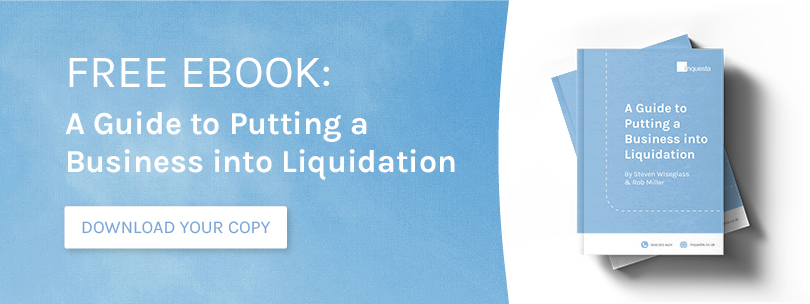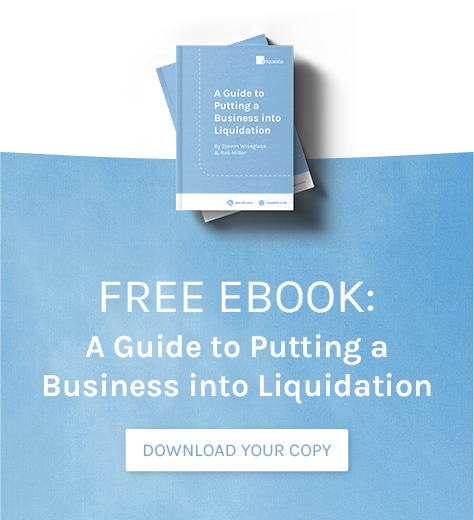As a business owner, it is common to feel like you should be ready for anything. However, the reality is that you cannot prepare for the unpreparable, the unexpected, or the unforeseen.
When it comes to running a company, you will learn very quickly that things can happen that you won’t expect. What makes a good owner is how the aftermath of something happening is handled.
Big events that have an impact on your ability to operate as a business can have a huge lasting effect on your finances, as well as causing unnecessary stress on you, your management team, your directors, and your workforce. So what options are available to you?
While you may not be able to accurately predict the future of your business, you can prepare for any eventuality with business interruption insurance. Designed to protect every facet of your company in the event of a major interruption to operations, business interruption insurance is a necessary yet highly complicated course of action for all directors/owners to undertake.
This blog will go into detail about business interruption loss calculations, including what interruption insurance is, what it covers, what extensions you may wish to consider, as well as focussing on how to actually go about making a claim.
What is Business Interruption Insurance?
Business interruption insurance is a form of insurance designed to cover business income that has been lost in a disaster. When such an event occurs that damages a company’s stock, forces them to move locations, or halts their operations altogether, business interruption insurance can be used to cover lost finances and any costs incurred as a result of the interruption.
It is surprisingly common for business owners to mistakenly believe that their building or contents insurance policies will come into effect to cover them if their operations are ever interrupted.
However, this is not truly the case. While it is true that these types of insurance will help you to right any damage to property or assets (depending on the type of insurance), they will not factor in the consequent losses your business will face during the interruption to trading.
Your business interruption insurance can also help with:
- Payroll: Stopping the payment of employee wages will likely lead to losing your workforce. People will not be able to afford to wait for the business to begin operations again until they next get paid. Your policy can help you make payroll while operations are forcibly wound down.
- Profits: Your policy should provide reimbursement for any profits you can tangibly prove you would have earned had your business been able to operate as-normal. .
- Taxes: Since a company will still be required to pay their taxes despite an interruption, your interruption insurance should allow you to continue to pay on time in order to avoid any potential penalties. Loan Repayment: Another outgoing that won’t stop despite an interruption is your loan payments. Your coverage should allow you to continue making these regular payments despite your reduced income.
- Temporary Locations: It is possible for your policy to cover any costs incurred with moving your operation to a temporary business location.
- Training Costs: If you are forced to replace your equipment or move to a new location with different tech, you may need to retrain employees.
- Required Payments: The reality is that there will still be some necessary expenses to keep the company afloat despite interruption. Your policy can help ensure you can get back onto solid ground.
The length of time that business interruption insurance will cover a firm is traditionally from the day the covered incident took place, until the date that the business is able to return to normal. Standard policies will generally offer coverage for up to 30 days, but will often accept extensions should the situation demand it.
It is unfortunately common that a company faced with a severe interruption to their business without any forms of insurance covering them, will eventually be forced into insolvency.
What is Covered by Business Interruption Insurance?
Business interruption insurance is designed to assist you in the event that you are forced to stop trading for any valid reason. What constitutes a valid justification for a claim will depend on your policy, your business, and your particular situation.
As a business owner, it is absolutely vital that you understand exactly what business interruption can cover you against. Potential scenarios that would be covered by business interruption insurance includes:
Damage to Property
Your business interruption coverage will provide you with a financial solution should property damage of any kind (burst pipes, fallen tree. etc.) force you into total closure of your business.
It is worth mentioning, unless stated otherwise that your policy will likely only cover you against total, forced closure. For example, if your car park floods and you are unable to welcome customers onto it, but there are parking alternatives nearby, your insurance providers may deem it as an invalid business interruption and you would not be covered should you close while you rectify the issue.
Fire Damage
Fire damage is generally considered to be the most common cause of business interruption claims. In a study, Allianz Global Corporate & Speciality found that around 59% of all interruption claims around the world were caused by fire and explosion.
Businesses are estimated to lose billions of pounds a year due to such incidents. The companies most at risk of damage by fire are those that deal with electricals, flammable liquids, and heavy machinery.
Natural Events
The increase in possible natural disasters around the world has also seen a rise in business interruption costs.
Natural disasters that would be covered by a business interruption claim include flooding, earthquakes, wildfires, and hurricanes. Depending on your location, it is also possible for cyclones and winter storms to be covered.
A natural event affecting your business would be some form of disaster occurring that inhibits your firm’s operations and impacts possible trade.
Disease
A majority of business interruption policies will contain some form of disease clause. The terms of this will ensure that a business will be covered in the event of an interruption caused by a ‘notifiable disease’ either at or within a certain distance of their premises.
However, the terminology of the clause as ‘notifiable disease’ is somewhat imprecise, meaning that many companies have been left unsure if their case is covered in their insurance.
This was particularly noticeable during the COVID-19 pandemic. As the most widespread modern example of a virus causing business interruption, not just in the United Kingdom but across the globe, it was widely expected by business owners that it would be covered by their policy. However, due to an inability to help every business, particularly at the pandemic’s peak, many companies were unable to seek assistance when they were forced to close due to an outbreak.
In the United Kingdom, as a direct result of thousands of businesses being forced to shut down as a result of the pandemic related interruptions, the Coronavirus Business Interruption Loan Scheme was set up. Open for applicants until March 2021, the scheme was set up to aid small businesses and ensure that they remained afloat during the virus’s peak.
Ultimately, if your business has been interrupted by a disease, it is important to check your policy to see if you are covered. Common diseases listed as ‘notifiable diseases’ are:
- Anthrax
- Food poisoning
- Rabies
- Yellow fever
A standard business interruption insurance may not cover all disease related interruptions, meaning your insurer would have no obligation to pay out a claim. However, it is always worth checking — to avoid some of the doubt though, you may be able to purchase cover that specifically supports a business in the event of disease related interruption.
Loss of Connectivity
Almost all businesses today will rely on the internet in one way or another. Some companies operate entirely online, some use equipment that needs connectivity to function, while others use online technology to keep track of what’s going on in the business.
In the modern business age, a loss of connection can impact a company more than nearly anything else. Events ranging from power cuts, web hosting supplier and date centre outages, and more, can cause a business to be unable to operate for a prolonged period of time. As a result, business interruption claims centred around connectivity issues are growing exponentially year on year.

Cyber Threats
Cyber security threats are one of the fastest growing causes of business interruption today. Formerly a fairly niche threat to most companies, the widespread adoption and reliance on technology in the business world this century has led to a growing importance in cyber security.
The risk of cyber attacks rises exponentially year on year as more firms shift their operations to focus more on technology than ever before.
Cyber attacks have the potential to totally wipe out a thriving company if not prepared for properly, and can cause a business to have to shut down. Examples of such attacks include viruses and malicious codes.
Breakdown of Key Equipment
Three of the most common causes of business interruptions are fires, floods, and theft. All of these are likely to lead to some disruption to operation, if not lead to complete closure for some time.
All of the examples above can have impacts on one thing however, equipment. While things like computers will likely be covered by your contents insurance and can hopefully be replaced fairly quickly and painlessly, more specialist items could take significantly longer, leading to prolonged spells of interrupted operations.
Your interruption insurance policy should cover your company if you are forced to wait for the installation of your new equipment and are unable to operate as normal.
Common Business Interruption Insurance Extensions
Your typical run-of-the-mill business interruption insurance policy will usually only cover losses directly linked to your premises or property. Very rarely will they take into account factors out of your direct control, such as interruptions to your supply line, or core customer base. However, such interruptions could be covered in the guise of an insurance extension.
When it comes to selecting your insurance, the extensions you may be able to add to your policy include coverage against losses as a result of:
- Damage to the premises of your suppliers
- Damage to your assets while in transit
- Damage to nearby areas/premises/properties preventing access to your business.
- Disease/vermin
- Death
For additional information on what extensions you can add to your property it is recommended that you consider getting in touch with an independent expert to make sure that you are totally protected against any potential issues.
What are the Different Business Interruption Insurance Exclusions?
The purpose of business interruption insurance is to safeguard your business against the unpredictable, to ensure that no matter what happens — if your company is unable to continue operations — that you are protected. However, business interruption insurance does not cover every single thing that could interrupt your company. Things like war, rusting, and pollution are typically excluded from any policy.
Business interruption insurance exclusions to be aware of often include any interruption caused by the following:
- Potential war
- Riots
- Contamination of any form
- Pollution
- Corrosion and Rust
- Common seasonal weather changes
- Power outage as a result of downed power lines
Additionally, business interruption will not cover any losses from a partial closure. If customers are able to enter your business but cannot access every amenity you typically offer, you may not be covered. For example if a shop with a cafe area is forced to close the cafe but the shop remains open for business, then they would likely not be covered under their insurance.
In order for you to be reimbursed for any losses, you must be able to prove to your insurance carrier that your business has suffered economic damages as a result of an interruption to operations. Any income lost that cannot be proven will be excluded from your policy and must instead be covered in-house.
How to Claim on Business Interruption Insurance
The most important thing you can possibly do to ensure that you have a successful business interruption insurance claim is to prepare. There are two crucial steps that must be taken, which are developing an appropriate plan and calculating the loss incurred.
Without preparation and due diligence your claim is likely to be rejected and you could be back at square one, in a huge financial hole. With this in mind, we have explained the two main steps in a bit more detail.
Develop a Plan
For any company wanting to make a successful business interruption insurance claim, it is pivotal that you internally come together to develop a thorough, detailed action plan. Some things you should be sure to consider in your action plan are:
- Review your insurance policy to determine your coverage
- Fulfil notification obligations to insurer
- If you feel it would help, find a legal professional to assist your claim
Calculate Business Interruption Loss
You will also need to calculate your business interruption loss. In order for your claim to be accepted, you will need to ensure that this calculation is correct and completely objective.
An important note to remember when you are looking to measure your business interruption loss is that you aren’t necessarily calculating the revenue lost, but rather the revenue lost compared to what you would have been expected to gain during the allotted period

Things you need to consider when calculating your business interruption loss would be revenue and profits lost, as well as any business insurance losses accrued.
How to Calculate a Business Interruption Claim
There are several key elements to making a business interruption loss calculation, including the time it took for your operations to return to normal, your expected revenue, and an estimate of your total lost revenue. Getting it right is vital to ensure you remain protected — no matter the circumstances.
Given the importance of the situation, it is a good idea to seek specialist assistance at your earliest opportunity if you ever become unsure. That being said, here are a few points you’ll need to consider:
- The first step when attempting to work out your business interruption loss calculation would be to evaluate policies and their indemnity period. Make sure that your provider will cover you for the duration of your interruption period. If you can, look for around 24-36 months.
- Draw a picture of the total length of time your business would need to return to normal day-to-day function. This should include estimates factoring in the time it takes to train any new staff, retrain key team members, obtain new equipment, getting important building regulations etc.
- Calculate the expected revenue your business would have earned had the incident not taken place using projections of the last 12/24 months of business. Things to take into account when working this out could be industry trends, the time of year, and growth of the business compared to previous years.
- Once this calculation is complete, it is important to go over the firm’s actual revenue. This would be revenue gained after the initial incident, up until the business is able to resume operation. Due to the knock on effect the incident will have had on the business, it is likely that any revenue accrued will be minimal.
- The next key statistic to work out is an estimate of the total lost revenue. To do this you should subtract the actual revenue from the estimated revenue.
- If relevant to your business, calculate the costs required for you to move your business into temporary premises. This figure should include finances such as rental fees, hiring of any necessary equipment, and allowances for staff to work from this new location.
- It is important to work out the expenses saved by your business during the period. These will be expenses usually incurred prior to the forced closure of your business. This will often include maintenance costs, utility bills etc.
- Calculate the expected payroll for each member of staff who may not be working throughout the closure. This should include wages, benefits, and compensation insurance.
- Finally, you should add up the total lost revenue, any costs accrued for moving to a temporary base, as well as expected payroll, and subtract the saved expenses. This should help you to get a better idea of the sum you need to be covered by your business interruption claim. Contact your insurance provider for a better understanding of exactly what coverage you have.
The Business Interruption Insurance Formula
A complex element in the claims process, the business interruption insurance formula is the method your insurer will use to work out the numbers behind your claim. The business interruption formula is :
Business Interruption (BI)=TxQxV
While this may look incredibly complicated as it is, the method becomes more clear once you have an understanding of what each element of the formula represents:
- Time: The T in the formula refers to the exact amount of time your operation was shut down/interrupted by something covered under your policy. For businesses operating inside of the United Kingdom, this period is defined as the fixed period of loss.
- Quantity: One of the most complicated aspects in any business interruption claim. Determining quantity refers to the perceived amount lost due to the interruption. This can be relatively simple if noted production is interrupted, but for a company who can’t accurately predict their output this can be difficult. It is the obligation of the policyholder to prove the actual loss. Generally this is done by analysing planned budgets, as well as anticipated output against historical trends. This approach is good for many, but if the interruption gets particularly long, or the company does not have access to historical data, it can be tough. If you find yourself struggling to work out quantity, it is recommended that you contact a specialist as soon as possible.
- Value: This refers to the actual value of each unit of production/output relative to lost profit. Similarly to quantity, this can be difficult to work out and prove to your insurer as it is, in essence, an estimate.

A common issue of the business interruption insurance calculation is that the three formula areas (Time, Quantity, and Value) have an element of subjectivity about them.
This grey area can make the actual claiming of business interruption complicated as some providers, particularly if your claim is significant, may wish to draw the process out to make sure that every single minute detail is accurate.
Should it ever seem like this may become an issue, if you have not already, it would be wise to instruct some form of outside counsel. A specialist insurance expert can support your case and ensure that disputes are avoided, and that each and every step in the process is completed properly and to the book, by all sides.
How Inquesta’s Business Interruption Loss Calculation Consulting Service can Assist
If your business has suffered unexpected financial loss because of an interruption to your operation caused by something out of your hands, we can help.
Inquesta have years of experience in supporting businesses going through exactly the same thing. We can provide a clear and honest insight into each aspect of your business and its finances to offer you a helping hand.
The expertise of the Inquesta team means that we are able to accurately calculate your losses, help to devise a detailed plan, assist with negotiations, and more.
The Inquesta team specialise in providing an unmatched business and financial management service. Contact our team, or request a free consultation today to find out more about how we can help you.




